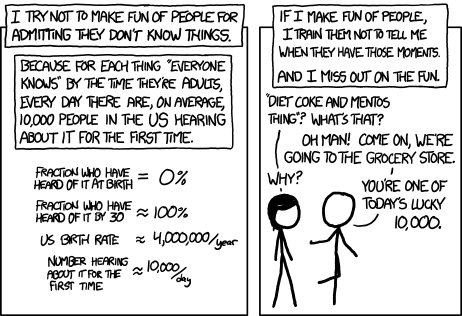First published 25 August 2017. Last updated 10 September 2017.
This is an introduction to a series of posts which I’ll write on an ongoing basis. The theme is to explore ideas I used to hold – why I held them, why I let them go, what I learned about myself or the world along the way, and how it all might inform discourse with others.
Posts in the series so far:
I figure this exercise ought to be as cathartic as it is useful, because I definitely have a tendency to change my mind and then forget, for all intents and purposes, what I used to believe. Remembering and studying the changes, though, has several obvious values:
(1) You may be able to understand your past self better than you can understand a conversational partner. Insofar as this is true, it makes it easier for you to gain insights about certain beliefs. This may enhance your understanding of the topic at hand. It may also make you better at persuading people to embark on the journey you’ve already finished. Vegans come to mind as a group who could benefit greatly from this kind of reflection. Many ex-omnivore vegans, unfortunately, seem to forget that they ever ate meat, and this is toxic to discourse.
(2) Besides making us more effective in conversation, this kind of reflection can also just remind us to be more charitable in our interpretations of others’ beliefs. I have actually caught myself scoffing at people for voicing beliefs I held a matter of months ago. Anthony Greenwald refers to the “rapid aging of new opinions“, which is relevant here. (Shout-out to @ludwig_raal on Twitter for introducing me to that phrase.) In some cases, this is especially unfortunate, because it may be that your conversational partner doesn’t oppose your view outright; they have simply never heard of it. If you remember that once upon a time, you had never heard of it either, then you may find yourself excited to share new information with them rather than merely disdainful of their wrongness. The world is a nicer and more productive place when we are generous in interpreting the statements of people we disagree with. An xkcd strip comes to mind:
(Title text: “Saying ‘what kind of an idiot doesn’t know about the Yellowstone supervolcano’ is so much more boring than telling someone about the Yellowstone supervolcano for the first time.”)
(3) Remembering past instances in which you’ve changed your mind is evidence that you’re an open-minded person. People tend to dismiss claims like “everyone thinks they’re open-minded, but I actually am” on the basis of illusory superiority. And of course, we are right to be skeptical of self-analysis in the absence of objective evidence. Various studies find that between 69% and 93% of drivers consider themselves to be above-average drivers. Some of them are guaranteed to be wrong. But does this mean that any discussion of one’s own driving ability is necessarily nonsensical? Of course not. We can talk objectively about how many miles we’ve driven, how many times we’ve been issued a citation, how many times we’ve been in an accident, and so forth. In the same way, we can point to times we’ve changed our minds as (at least weak, suggestive) evidence of real open-mindedness.
(4) Talking openly and favorably about mind-changing erodes the harmful and prevalent idea that changing one’s mind is shameful, amounts to “losing face“, and should be avoided. We all need to assign more value to “listening rhetoric” and less value to “win rhetoric”.
(5) Remembering times that you’ve been wrong is a good reminder to be even humbler and more open-minded going forward.
I’m going to make an effort to remember that last point in particular as I grow this blog. I’m often guilty of thinking, “I shouldn’t write about this yet, because I don’t know enough – maybe after I read a few more books.” There’s some infinite regress danger there. Really, the writing is itself part of the learning process. So here’s to writing a lot, being wrong a lot, and learning a lot.

Excellent approach! We often hear or read talk of being reflective as if these terms are as obvious as longitude and latitude lines on a map. Go here, open mindedness, or go to reflectiveness take a left and when find opened minded mess, fuel up and go straight north to find enlightened thinking. How much has be written or researched on open minded thinking? I’ve taken a class or read book on critical thinking, or can throw a statment on a truth table to see if its a logical statement. But how do we know were are thinking open mindedly and not just falling further into self delusion? (I must be clever to have come up with that! Lol)
LikeLike